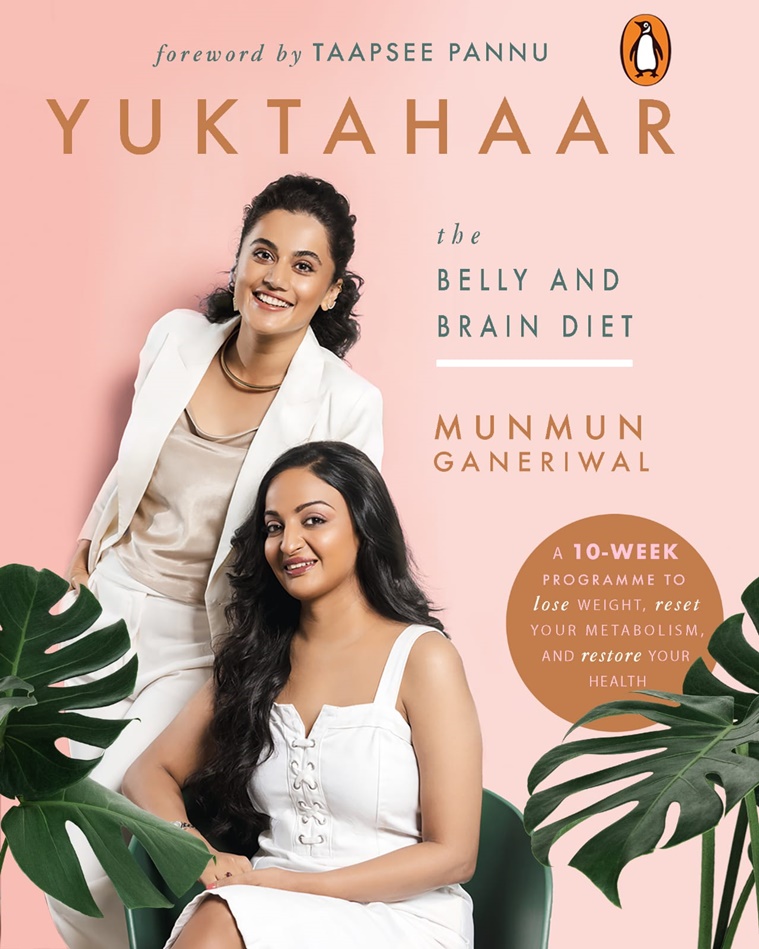 Munmun Ganeriwal shares more about gut health (Source: Munmun Ganeriwal/Instagram)
Munmun Ganeriwal shares more about gut health (Source: Munmun Ganeriwal/Instagram) Actors Taapsee Pannu, Rakul Preet Singh, and Nayanthara swear by her fitness mantras. Meet celebrity nutritionist Munmun Ganeriwal who, instead of sticking to one diet type of diet, emphasises on eating everything without guilt, but in a conscious way.
In fact, “extreme forms of diets or torturing yourself with insane workouts is never the solution”, Munmun believes, writes Taapsee in the foreword of the gut microbiome specialist’s debut book, Yuktahaar: The Belly and Brain Diet.
“The eating habits she introduced me to helped accelerate my metabolism when I thought it was almost close to dead. Her emphasis on traditional foods and yogic way of living, along with a thorough knowledge of how these can be adapted to suit the needs of urban life, has helped me bring alive a variety of characters on screen,” writes Taapsee, 34, whose “sustainable” diet has helped her gut “heal”.
View this post on Instagram
According to Munmun, the rate of increase in diseases has a lot to do with one’s gut microbiome. A disbalance can wreak havoc, and result in lifestyle diseases like obesity and diabetes. “Gut health is about being able to digest, assimilate and extract nutrients from a variety of foods, effectively and effortlessly. You may eat the best superfoods of the world but without a healthy gut function, nutrients from these foods won’t reach your cells and tissues and will fail to benefit you. On the other hand, if your gut is healthy, then the nutrients are assimilated well and transported throughout the body, the effects of which you see everywhere, from your skin to your hair, from better mood to better sleep, from better hormonal balance to say, better heart health,” said the expert, who has over 19 years of experience in the nutrition field.
When Munmun happened to attend a five-day ‘Nutrition 2019’- the annual flagship meeting of the American Society for Nutrition (ASN), she realised there wasn’t much spoken about gut microbiome in India. “That is when and why I decided to write a book on this subject. I see myself as a science communicator, and attempt to bridge the ‘knowledge gap’ that exists between research scientists and the common man. Since I aim to bring out the scientific discussions done behind closed doors, I make an honest attempt to sift, sort, and translate scientific data in a simpler way that is easily understood and relevant to Indian population,” she recalled.
Munmun, who holds a masters degree in nutrition science, is an internationally certified fitness instructor and a yoga teacher who follows the Sivananda lineage of yogic traditions. Considering the interdependence of the fields, she stresses on how emotional, mental, and physical health are related to one’s gut — called ‘deep health’. “Our physical, mental, and emotional health together constitute what I call ‘deep health’. We might want to believe otherwise, but factually speaking, all these three domains are deeply entwined and interdependent. If you struggle in one, you will see yourself grappling in the other. For instance, a person with chronic acidity is often also a person who leads a mentally stressful life, someone with depression is more often than not, also found to be dealing with constipation issues. The good news is that small, sustainable changes can go a long way in improving our ‘deep health’,” she mentioned.
She explained how, in Ayurveda, at the outset of treatment for almost any condition, the elimination of Ama or toxins and enhancement of Agni or digestive fire is sought. “In the yogic tradition too, Muladhara chakra is said to be the foundation that has an effect on the entire body system as a whole. Your gut happens to be at the Muladhara, thereby driving home the point that gut health is at the core of holistic health. Restoring your gut microbiome will not only help you lose weight, reset your metabolism, support immunity but will also help you restore your mental health and overall well-being,” she mentioned.
 Munmun Ganeriwal’s new book is out (Source: PR Handout)
Munmun Ganeriwal’s new book is out (Source: PR Handout) For Munmun, eating right, exercising regularly, practicing good sleep hygiene, and regular practice of yogic practices like meditation, pranayama help heal the gut, which, in turn, helps improve ‘deep health’.
The nutritionist has also been studying Advaita Vedanta — propounded by Sri Adi Shankaracharya — for a few years now, which finds space throughout the book, too. “If the Western world has influenced us to obsess over body size, body curves etc., the Indian philosophy tells us that our bodies and minds are mere tools to achieve higher pursuits, hence they should be taken care of but at the same time, obsessing over it is foolishness. You would want to take care of your car so that it functions well, drives you to your destination but would you obsess over its colour, body shape, size etc.? Same difference. This dispassionate attitude is called ‘vairagya’ in Indian scriptural texts and is an important prerequisite for those who want to progress in life in all aspects, physically, emotionally, mentally and spiritually,” she expressed.
View this post on Instagram
Has the pandemic been a game changer when it comes to food and fitness? As per Munmun, more than a game-changer, the pandemic has given a “reality-check”.
“Any crisis can bring out either the good or the bad in us. It really depends from person to person; how they decide to respond to the given situation, whether they let the situation overpower them or whether they do what is best possible in the given scenario and take charge of the situation. The Covid-19 pandemic was no different. If it made some people more conscious about food and how it can impact our bodies, our mental health and immunity, then I also came across many people who just gave in to binge eating and sustained on packaged, processed foods during the lockdowns only to regret later. As far as health and fitness go, I don’t think that the pandemic has been a game-changer for everyone but it definitely did give a reality check, that much needed wake-up call to the public at large,” she opined.
She recommends top 10 tips that are can work wonders for anybody and everybody
Eat a light breakfast
Make lunch the biggest meal of your day
Eat, but don’t graze. By keeping sufficient meal gap, you allow true hunger to build in between meals. Eat only when you are ‘truly’ hungry
Count on the quality of the food, not the calories
Chew your food well. Go slow and take breaks throughout the meal
Keep your mind relaxed while eating
Maintain regular meal timings
Eat with the sun. Wake up early and feed yourself soon after you wake up. Stop eating close to sunset.
Sip on hot (or lukewarm) water throughout the day
Practice Anulom Vilom 10-15 minutes before bedtime
📣 For more lifestyle news, follow us on Instagram | Twitter | Facebook and don’t miss out on the latest updates!
- The Indian Express website has been rated GREEN for its credibility and trustworthiness by Newsguard, a global service that rates news sources for their journalistic standards.

